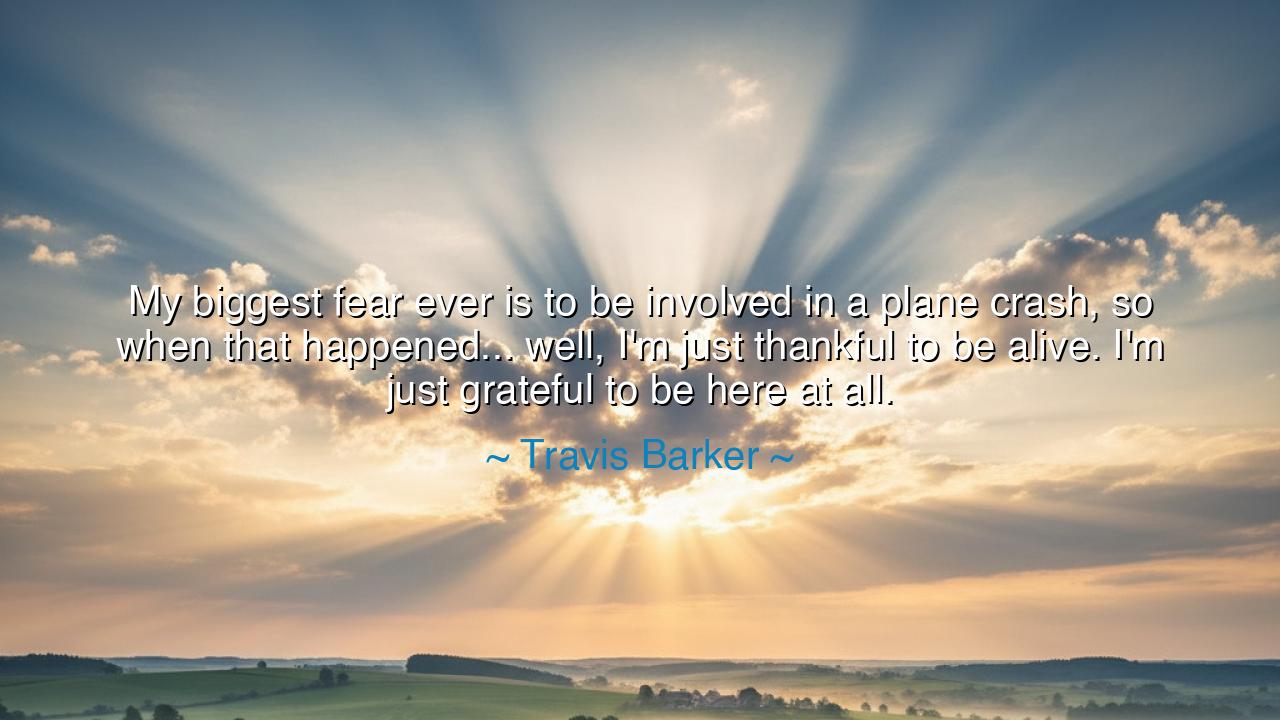
My biggest fear ever is to be involved in a plane crash, so when
My biggest fear ever is to be involved in a plane crash, so when that happened... well, I'm just thankful to be alive. I'm just grateful to be here at all.






Travis Barker once spoke with raw honesty and trembling reverence: “My biggest fear ever is to be involved in a plane crash, so when that happened... well, I’m just thankful to be alive. I’m just grateful to be here at all.” In these words we hear not the boasting of a survivor, but the awe of a man who stared into the abyss and returned. They remind us that life, so often taken for granted, is fragile beyond measure, and that the true treasure is not wealth or fame, but the sheer miracle of breath, heartbeat, and consciousness.
The origin of his words lies in tragedy. Barker, the drummer known for his energy and fire on stage, endured what so many fear: a plane crash that took lives and nearly claimed his own. He was left with pain, scars, and memories no man would willingly carry. Yet from that ordeal, he emerged with a heart transformed. His gratitude is not casual—it is born of fire, forged in the crucible of near-death, where every moment becomes luminous because it was nearly lost.
The ancients would have recognized such a testimony. They told stories of heroes descending into the underworld and returning forever changed. Orpheus, Aeneas, even Odysseus—each journeyed into darkness and came back with wisdom and a deeper reverence for life. Barker’s survival is such a journey. He was plunged into his greatest fear, stripped of control, and delivered by fate into the fragile gift of continued existence. In his thankfulness, he mirrors the wisdom of these ancient myths: that one cannot truly value life until one has stood at the edge of death.
Consider the tale of Marcus Aurelius, emperor and Stoic philosopher, who wrote in his meditations: “When you arise in the morning, think of what a privilege it is to be alive, to breathe, to think, to enjoy, to love.” He wrote these words in the shadow of war, plague, and death. His reflection echoes Barker’s gratitude: both men, separated by centuries, proclaim the same truth—that to simply be alive is an honor greater than any throne or stage. Survival itself is the triumph.
The deeper meaning of Barker’s words is that fear loses its dominion once it is faced. His greatest terror became his reality, and yet he endured. By surviving, he learned that life beyond fear is not lived in trembling, but in gratitude. His declaration “I’m just grateful to be here at all” is not weakness but victory—the victory of the human spirit to find light even after being broken by fire and tragedy. This is not the shallow gratitude of comfort, but the fierce thanksgiving of one who has seen death and chosen to live.
The lesson is clear: do not wait for disaster to awaken your gratitude. Do not let the value of your life remain hidden until it is nearly stolen from you. Begin now to see every moment—your loved ones, your breath, your waking and your sleeping—as gifts. To practice gratitude daily is to live as Barker lives after the crash: aware, humbled, and yet emboldened. For life itself is the prize.
Practically, this means pausing each day to recognize the miracle of existence. When fear grips you, remember that survival itself is a form of victory. Speak gratitude aloud to those you love, for tomorrow is not promised. And when tragedy or trial comes, as it surely will, let it refine you into deeper thankfulness, rather than bitterness. In this way, you live not merely by chance but with intention, carrying forward the ancient wisdom that the fragile gift of life must never be taken for granted.
Thus, Travis Barker’s words resound as a testimony to all generations: fear may pursue you, tragedy may break you, but to rise from the wreckage with thankfulness is to live as more than a survivor—you live as one reborn, a witness to the sacred miracle of being alive.






AAdministratorAdministrator
Welcome, honored guests. Please leave a comment, we will respond soon